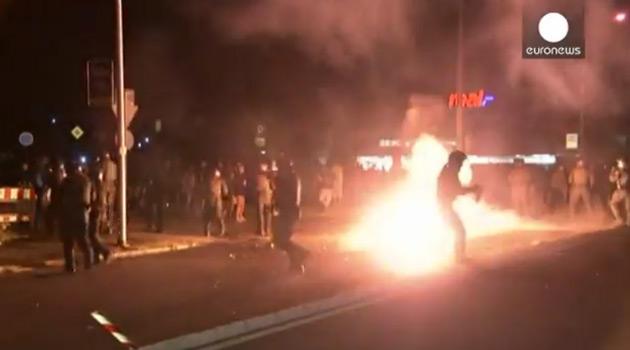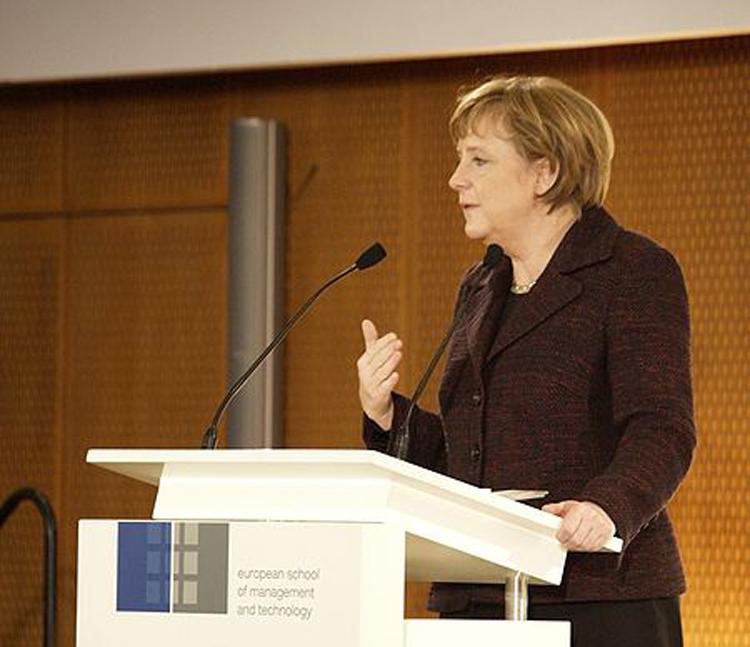Germany recalls last year's violent clashes between police and those opposed to refugees in Heidenau

One year ago, Germany was shaken by the violence that played itself out in Heidenau. On the nights of 21, 22 and 23 August 2015, the small Saxon town was awaiting the arrival of hundreds of refugees for whom an accommodation facility had been quickly prepared there.
What began as a calm demonstration by more than 1 000 opponents of migration turned into a march. In front of the mayor’s home, local residents with their children and obvious neo-Nazis shouted that he was a “Traitor to the naton” and began to block the highway towards evening.
As soon as police closed the road in front of the refugee shelter and attempted to disperse the unannounced assembly of infuriated locals using tear gas, the neo-Nazi dmeonstrators began throwing fireworks and rocks at them, leading to a street battle between the neo-Nazis and police, something Germany had not seen for a very long time. How did the country cope with this Saxon version of the Czech Republic’s 2008 “battle for Janov”?
Only 140 police officers were deployed, which a police spokesperson subsequently called “sufficient”. The upshot of the police intervention, however, showed that the protectors of public order experienced a crushing defeat: 31 members of the force were injured, some of them seriously.
Moreover, significant damage was caused to municipal property and police vehicles. Over the next few days the town was visited by Vice-Chancellor Sigmar Gabriel, the chair of the Social Democratic Party (who called the demonstrators “right-wing vermin”), then by Justice Minister Heiko Maas, and finally by Chancellor Angela Merkel, all with the aim of calming the situation and publicly condemning the violent attacks, which news server Romea.cz reported on here.
Czech Police compared to the Saxon Police
These clashes between citizens and police were reminiscent of the “battle for Janov” in the North Bohemian town of Litvínov in the autumn of 2008. In that incident, anti-Romani sentiment peaked in the Czech Republic and the Workers Party, which was still legal back then, convened its supporters to fight the “inadaptables” there.
The fear and tensions, fed for months by populist politicians, spilled into the streets. After a racist demonstration on the main square, a mob of 1 000 set off on an unannounced march toward the local housing estate of Janov.
Hundreds of police officers spent hours successfully preventing the mob from reaching Romani people’s homes to lynch them. Those were the biggest clashes between citizens and police in the Czech Republic since the International Monetary Fund conference in Prague in September 2000.
Just like last year in Heidenau, in 2008 the Czech Police at Janov were not sufficently prepared for the brutality and professional organization of the demonstrators. Despite the fact that 18 police officers suffered serious injuries, and despite the extent of the property damage (one municipal police vehicle set on fire, another damaged, the fences in people’s yards destroyed), nobody was arrested at the scene.
After a lengthy process and protests by human rights organizations, 13 persons were charged, but only two were ever prosecuted. One perpetrator was ultimately convicted and sentenced to 300 hours of community service, while the other was acquitted for lack of evidence.
Four particular neo-Nazis from Silesia in the Czech Republic participated in those violent clashes. As was later proven in court, after returning to Opava later than night from Janov, those four decided to carry out a “bigger action”, boosted as they were by the support expressed for them by the non-Romani
residents of Janov, by the inability of the criminal police to apprehend the neo-Nazis – and later, by the inability of the courts to punish the violence.
They made good on their intentions on 18 April 2009 by committing an arson attack in the Silesian town of Vítkov. The consequence of that attack for one of the victims, a two-year-old who suffered severe burns, should be a sufficient warning for Czech society of the dangers of this ideology.
Hard to prosecute when you’re unprepared
Let’s look at how the Saxon Police and the German courts have dealt with a similar phenomenon. Because not enough police were deployed, they were unable to document the violent nighttime clashes in real time, so detectives had to spend entire weeks on the painstaking work of collecting and evaluating video footage from CCTV cameras and the videos filmed by those participating in the demonstration.
At the beginning of this year, the Saxon Police announced that the number of persons suspected of criminal activity in the incident was 48. Wolfgang Klein, spokesperson for the Prosecutor-General in Dresden, recently clarified that his office began 41 criminal proceedings in the matter, 22 of which led to indictments and just 10 of which led to verdicts.
The rest of the proceedings were halted for lack of evidence or because the actions that could be proven were not serious enough to prosecute. Klein did not announce whether the courts acquitted or convicted the defendants.
According to the German online media server MDR Sachsen, the longest sentence handed down so far in this matter is a prison sentence of a year and eight months, apparently for severe breach of the public peace. That is the German term for participating in a mob riot during which widespread property damage or injury happens.
One defendant got a suspended prison sentence, while others were just fined. The prosecution of a local woman who used obscene insults in front of television cameras toward the Chancellor as she visited the endangered refugees was halted for the simple reason that Merkel did not press charges.
Klein pointed out that as a consequence of the increased number of violent group attacks by neo-Nazis, a specialised police “Unit to Combat Ideologically Motivated Crime” was established after the violence in Heidenau. He said that unit will now aid with discovering any eventual ties between suspects and extremist groups and facilitating connections of the criminal prosecutions of specific suspects who have committed crimes repeatedly in various locations.
The problem was not “imported”
Last summer the Saxon Government, as well as the mayor of Heidenau, both alleged that “professional demonstrators” from elsewhere in Germany who allegedly travel around the country just to spark such clashes were responsible for the increased number of riots in the state. To mark the upcoming anniversary of “Heidenau”, the Green Party faction in the Saxon State Assembly asked during a legislative session to what extent residents of Saxony had contributed to the racist unrest.
The answer delivered to the legislature was that more than 90 % of those who were suspected by Saxon Police last year of committing crimes in connection with neo-Nazism came from Saxony. Here we must point out that under the rule of law, “being suspected” has no bearing on an individual’s eventual guilt or innocence.
What is significant in this context is just that the Saxon Police themselves suspected mainly residents of Saxony of comitting crimes during the unrest against the refugees. Valentin Lippmann, an assembly member and domestic policy spokesperson for the Greens in the Saxon State Assembly, said in this context that “Whoever alleges that Saxons are immune to neo-Nazism is gravely mistaken.”
The question also revealed that a relatively high number of suspects came from the municipalities that have acquired such a sad reputation due to the mass attacks on the shelters – 31 persons came from Heidenau and its surroundings, which in comparison with other towns is a rather high number. “Potential perpetrators apparently felt encouraged by the strong racist atmosphere in those towns and their inhibitions toward committing such crimes were significantly lowered,” Lippman said.
Who contributed to calming the situation?
To allege that the Saxon Criminal Police is competent and willing to prosecute such crimes in comparison to the Czech Police is, of course, only half-true. For the time being, nobody has been prosecuted in either the Czech Republic or Saxony for organizing these violent clashes, although it is clear that somebody must have conspired to prepare the entire incident, and professionally, in such a way that police were incapable of nipping it in the bud.
For that reason, various anti-Fascist organizations in Saxony are now convening a demonstration on the first anniversary of last year’s events in Heidenau called “We do not forget. Let’s break the silence in the Saxon countryside.”
These organizations are demanding police completely clarify all of the attacks committed against refugees. The mayor of Heidenau doesn’t like that at all.
Mayor Jürgen Opitz of the Christian Democratic Union does not want to comment on last year’s events – he is concerned that publicizing the anniversary could again unleash clashes. One year ago he did his best to bring the residents of the town together and encourage them to be tolerant.
“I am mayor of everybody in Heidenau,” he has emphasized again and again. “My task is to be here for everybody, both those who are having a difficult time and those who have a problem even forming an opinion.”
From the beginning the mayor has clearly distanced himself from the racists. “Anybody demanding that the influx of refugees be stopped actually wants to see barbed wire strung up, and whoever is demanding barbed wire on the borders actually wants refugees to be ordered shot on sight,” he said.
Police had to provide him with professional protection for several weeks after he made those remarks. Ultimately he succeeded with his concept and was even awarded the “Saxon Prize for Democracy” in the local government category by several human rights foundations (there was no money attached to the award).
The refugee shelter in his town has been closed in the interim and its residents have moved into apartments. Calm once again prevails there.
At the end of 1989, Opitz was a co-founder of the “New Forum”, the East German equivalent of the Civic Forum in the Czech Republic, and it seems he is the same person today that he was then. Of course, he didn’t achieve calm in Heidenau all on his own.
Stefan Locke of the German newspaper Frankfurter Allgemeine Zeitung says the media rarely reported last year on how, during a very brief time, hundreds of local volunteers actively got involved in supporting the refugees, collecting clothing, money and toys for them, giving them German lessons, and spending time with the children. “The volunteers lasted eight months in the town, the brawlers just two days,” he writes.
Consequences of Heidenau
In the long term, the Heidenau phenomenon made a contribution toward changing Germany’s approach to refugee policy. The Government opened the country’s borders at the beginning of last September irrespective of what other European Union Member States had to say about it.
Subsequently, hundreds of thousands of citizens voluntarily got involved with integrating the country’s new inhabitants. At the same time, the German Government is now pressuring the owners of social networking sites to prevent racist online posts from circulating.
While demonstrations against refugees are dwindling, the number of violent assaults against anti-Fascists and refugees are rising. However, the Criminal Police frequently prosecute these cases quite strictly now.
Shelters today are just used for the short-term accommodation of refugees. Asylum-seekers are being moved into social apartment units much more rapidly in order to prevent their ghettoization and reduce the number of potential targets for the neo-Nazis to eventually attack.
Even Stanislaw Tillich, Prime Minister of Saxony, admitted this year for the first time that his state has a serious “problem with right-wing extremism. It is bigger than I suspected.”
Nevertheless, many German voters currently claim they favor the anti-Semitic, populist, racist Alternative for Germany (AfD) party. In part this is because politicians like Tillich have been parroting the AfD’s positions all year long.
